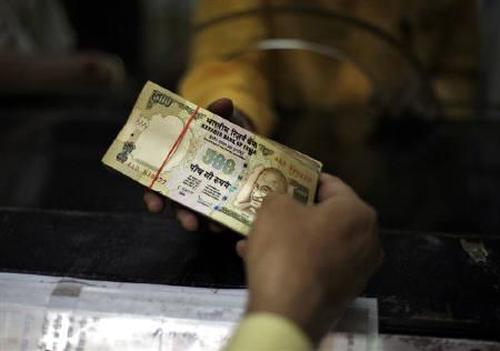 | « Back to article | Print this article |
Why small taxpayers are easy targets for I-T Dept
A former income tax commissioner recalls, "Once, I was given a target of Rs 75 crore. As I was new to the department, I didn't know how to go about it. I was asked to start with those with Rs 25,000-30,000 of refund claims with the department, as this group could be pressured easily."
This helped him collect 40 per cent of the refunds. His colleagues helped him secure the remaining amount.
As one gains experience in the system, one is allowed to catch the "bigger fish", he says, adding,
"Year-end income tax collection targets are a pain. When the country grows only 9 per cent, the finance ministry raises targets 25-30 per cent. What can we do? We have to push ourselves on susceptible targets."
He says the mandate given to income tax officials is "get the money now. We'll see if it has to be paid back as refunds. If nothing else works, at least get 50-60 per cent of the amount".
Often, if a 'big fish' is caught, officials think their work is done. However, such people bribe their way off the net. And, the pressure on officials increases.
Click NEXT to read more...
Why small taxpayers are easy targets for I-T Dept
"Once, the department's collections exceeded the target. Next year, a big chunk had to be paid as refund. Unfortunately, our boss changed. He had experience in the department; he instantly increased the target by 50 per cent. Each new head did this, often because he had to show he was efficient in leading the department," says the former commissioner.
Tax experts say this is the primary reason why the income tax department pulls up people for non-payment, high-value transactions, not filing returns, not furnishing information in the Annual Information Return, and so on.
A tax consultant said one of his clients, involved in the real estate business, had paid tax on gains according to his business income. He was a property dealer.
When one buys and sells property or any other asset with the intention of making profits, it is considered a business.
Though the tax authorities agreed to this, they asked the client to pay capital gains tax, saying the tax paid earlier wasn't enough, the consultant said.
To nab tax evaders, the income tax system tends to punish small taxpayers who might not have done any wrong.
"Haven't you seen the movie Kahaani? In that film, a police officer terms the sacrifice of civilians for the sake of national security 'collateral damage'. Individuals would be pulled up if we want to catch evaders. There is no other way," says a finance ministry official, on condition of anonymity.
Click NEXT to read more...
Why small taxpayers are easy targets for I-T Dept
It is, therefore, no surprise that individuals panic when the word 'tax' is mentioned. While tax authorities are always dreaded, the authorities look at individuals as evaders, to say the least.
While no side is completely wrong, there a constant tussle between the two. Ten days ago, Hyderabad-based Yogendra Sharma (name changed on request) received an e-mail titled 'Intimation U/S 245 of Income Tax Act, 1961'.
The mail was from the Central Processing Centre (CPC), Bangalore. It informed Sharma, who was awaiting refunds for 2011-12, that he might not get the refunds immediately.
Section 245 of the Income Tax Act relates to setting off payable refunds against unpaid tax dues.
The mail, a copy of which is available with Business Standard, reads, "Please refer to the return of income filed by you for PAN XXXXXX for assessment year 2012-13. The refund determined in this proceeding is being adjusted against the outstanding demands."
It added the refunds were adjusted for tax dues in 2006, 2008 and 2011. Some have received such mail for dues pending since 2002-03.
Sharma is among the 70,000 taxpayers who've received such mails. Revenue Secretary Sumit Bose has said another 35,000 are yet to get these "polite letters".
Click NEXT to read more...
Why small taxpayers are easy targets for I-T Dept
In another instance, a person received a demand notice for a few lakhs for 2007, against a small refund some years ago. The details showed the assessing officer had not given credit for tax deducted at source (TDS) from his salary.
Though this was rectified and he was again eligible for refunds for 2011, the assessment was adjusted with the refund against the overdue for 2007. The CPC mail says in case of any discrepancy, one ought to contact his/her jurisdictional assessing officer.
But Sharma's chartered accountant says, "Sharma's employer did not submit TDS in 2008. The authorities want us to contact the employer and ask them to submit TDS and file returns for it. Obviously, the employer won't listen."
There are hundreds of instances of honest taxpayers being pulled up.
Many who filed e-returns on time were told they didn't file returns. Sometimes, income tax returns verifications aren't accepted because these reached CPC from a different ward that didn't correspond with the ward number against a particular PAN.
B K Vatsaraj, senior partner of Vatsaraj and Co Chartered Accountants, feels the old system of maintaining records in writing led to this chaos.
Probably, records weren't updated at various wards and during computerisation, the incomplete data wasn't verified, he said.
Click NEXT to read more...
Why small taxpayers are easy targets for I-T Dept
"When CPCs were computerised, assessing officers fed wrong and incomplete data to meet their deadline, despite being asked to verify arrears and upload data. Today, the manpower crunch doesn't allow the system to rectify this problem," says Gautam Nayak, partner of Contractor, Nayak and Kishnadwala.
The finance ministry official says this might be just the beginning of taxpayers' woes.
Five years ago, Mumbai-based Kanupriya Kumar (name changed) received a letter from the income tax department to report to the Ayakar Bhavan, Mumbai regarding a matter related to a deal worth Rs 65 lakh (Rs 6.5 million).
"This was the cost of the house I had purchased on a joint loan with my husband. There was no discrepancy. They asked irrelevant questions such as why had I taken a loan when I earned only Rs 30,000 a month and why did I withdraw Rs 20,000 twice on the same day sometime when I bought this property," she says. She settled the matter through a payment of Rs 10,000.
However, as luck would have it, after the purchase of another house, she has again been summoned.
There is no denying there are many who don't pay/file taxes. But does it mean the tax department should be harsh with everyone?





